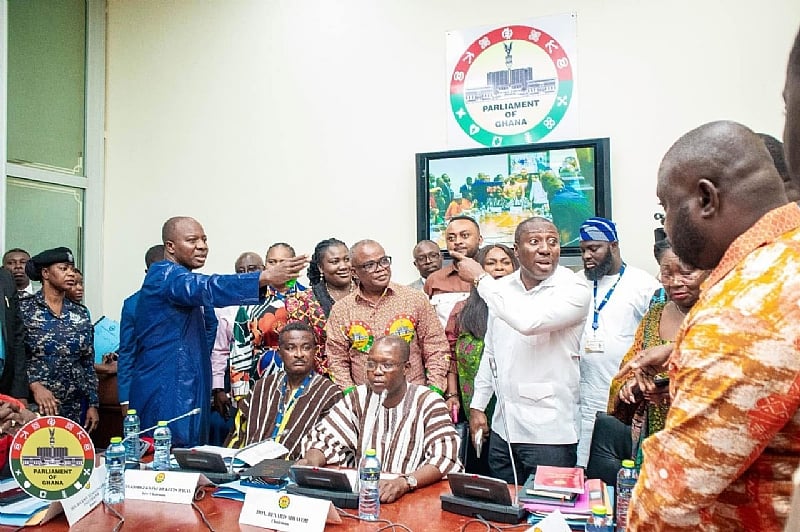The ongoing vetting process of ministerial nominees in Ghana’s Parliament has witnessed a growing tension between the Chairman of the Appointments Committee, Bernard Ahiafor, and the Minority Leader, Alexander Afenyo-Markin. Ahiafor, while acknowledging a personal friendship with Afenyo-Markin, has publicly expressed his disapproval of the Minority Leader’s conduct during the proceedings, characterizing it as exhibiting double standards and creating unnecessary difficulties. Ahiafor’s core grievance stems from what he perceives as Afenyo-Markin’s tendency to renege on previously agreed-upon decisions. He cites instances where consensus reached between the two leaders is later overturned by Afenyo-Markin, a pattern that Ahiafor finds frustrating and detrimental to the smooth operation of the committee. This behavior, he argues, creates an environment of unpredictability and undermines the trust necessary for effective collaboration.
Ahiafor’s concerns extend beyond mere procedural disagreements. He alleges that Afenyo-Markin’s actions are often driven by external pressures, specifically from the New Patriotic Party (NPP), which Afenyo-Markin represents. This influence, Ahiafor suggests, compromises the integrity of the vetting process and raises questions about the Minority Leader’s ability to act independently and in the best interest of the parliamentary process. A specific example cited by Ahiafor revolves around the vetting of nominee Kwabena Mintah Akandoh. Ahiafor claims that Afenyo-Markin initially agreed to Akandoh’s vetting, acknowledging Akandoh’s personal appeal and the presence of constituents who had traveled to witness the proceedings. However, Afenyo-Markin later reversed his position, allegedly due to pressure from the NPP, leading to disruption and chaos within the committee. This incident, according to Ahiafor, exemplifies Afenyo-Markin’s susceptibility to partisan influence and his willingness to prioritize party directives over previously established agreements.
The implications of this strained relationship between the Chairman and the Minority Leader extend beyond personal differences. The vetting process, a crucial component of Ghana’s democratic system, is designed to ensure the suitability and competence of individuals appointed to ministerial positions. A collaborative and transparent approach is essential for this process to function effectively. However, the disagreements and inconsistencies highlighted by Ahiafor suggest a breakdown in communication and trust within the Appointments Committee, potentially jeopardizing the integrity and effectiveness of the vetting process itself. The public airing of these internal conflicts further erodes public confidence in the parliamentary system and raises concerns about the ability of elected officials to transcend partisan interests and prioritize the national good.
Ahiafor’s public criticism of Afenyo-Markin underscores the inherent challenges of maintaining impartiality and objectivity within a politically charged environment. The vetting process, by its very nature, involves scrutiny of individuals aligned with different political ideologies and agendas. The expectation is that members of the Appointments Committee will approach their task with a commitment to fairness and a willingness to engage in constructive dialogue. However, when personal relationships and partisan loyalties come into play, the risk of bias and procedural irregularities increases significantly. The situation in Ghana’s parliament serves as a reminder of the importance of establishing clear guidelines and protocols for the vetting process, coupled with robust mechanisms for addressing conflicts of interest and ensuring accountability.
The unfolding events within Ghana’s Appointments Committee raise broader questions about the role of political parties in shaping the conduct of elected officials. While party discipline and cohesion are important aspects of a functioning democracy, they should not come at the expense of independent judgment and the ability to engage in constructive dialogue with opposing viewpoints. The allegations against Afenyo-Markin suggest a scenario where party pressure has overridden his personal judgment and commitment to the established procedures of the vetting process. This raises concerns about the potential for political parties to exert undue influence over parliamentary proceedings, undermining the principle of separation of powers and the ability of parliament to act as an effective check on executive power.
Moving forward, it is crucial for Ghana’s Parliament to address the issues raised by Ahiafor and to take steps to restore public trust in the vetting process. This requires open and transparent communication between the Chairman and the Minority Leader, a renewed commitment to upholding established procedures, and a willingness to prioritize the national interest over partisan considerations. Furthermore, mechanisms for ensuring accountability and addressing conflicts of interest within the Appointments Committee should be strengthened. The ongoing situation in Ghana serves as a valuable case study for other democracies grappling with the challenges of maintaining impartiality and effectiveness in parliamentary processes, particularly in contexts of heightened political polarization.














